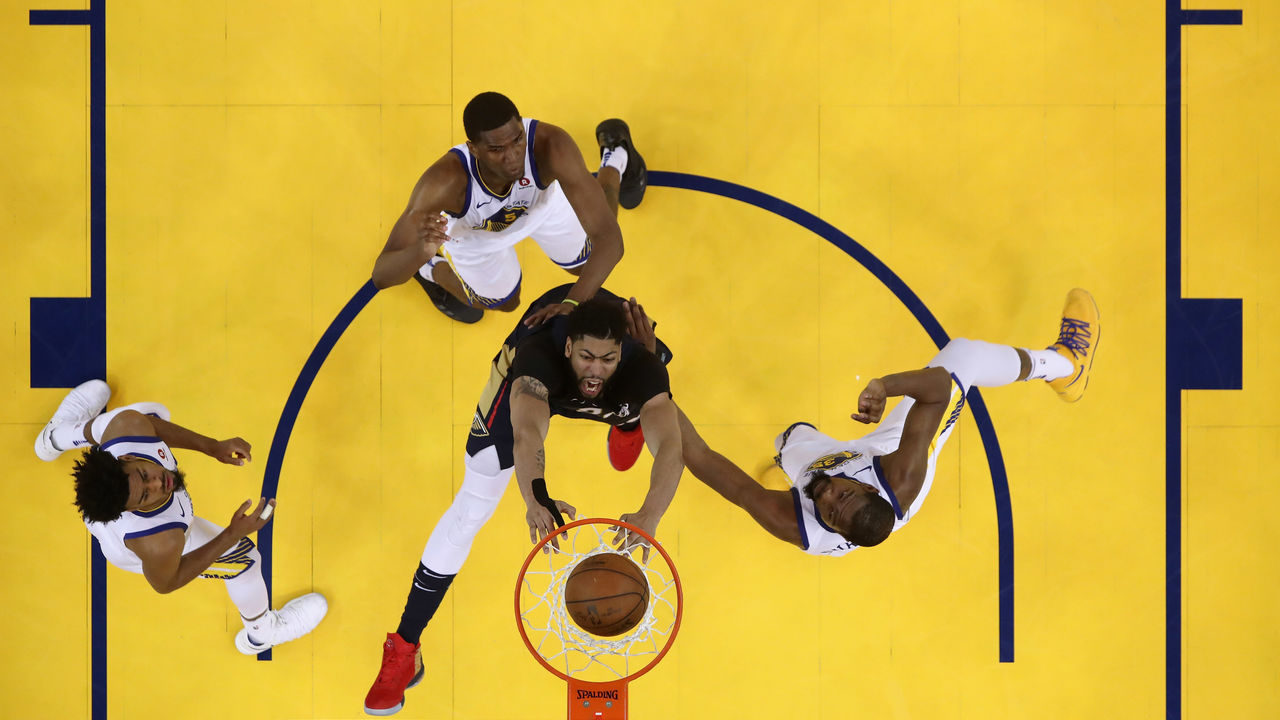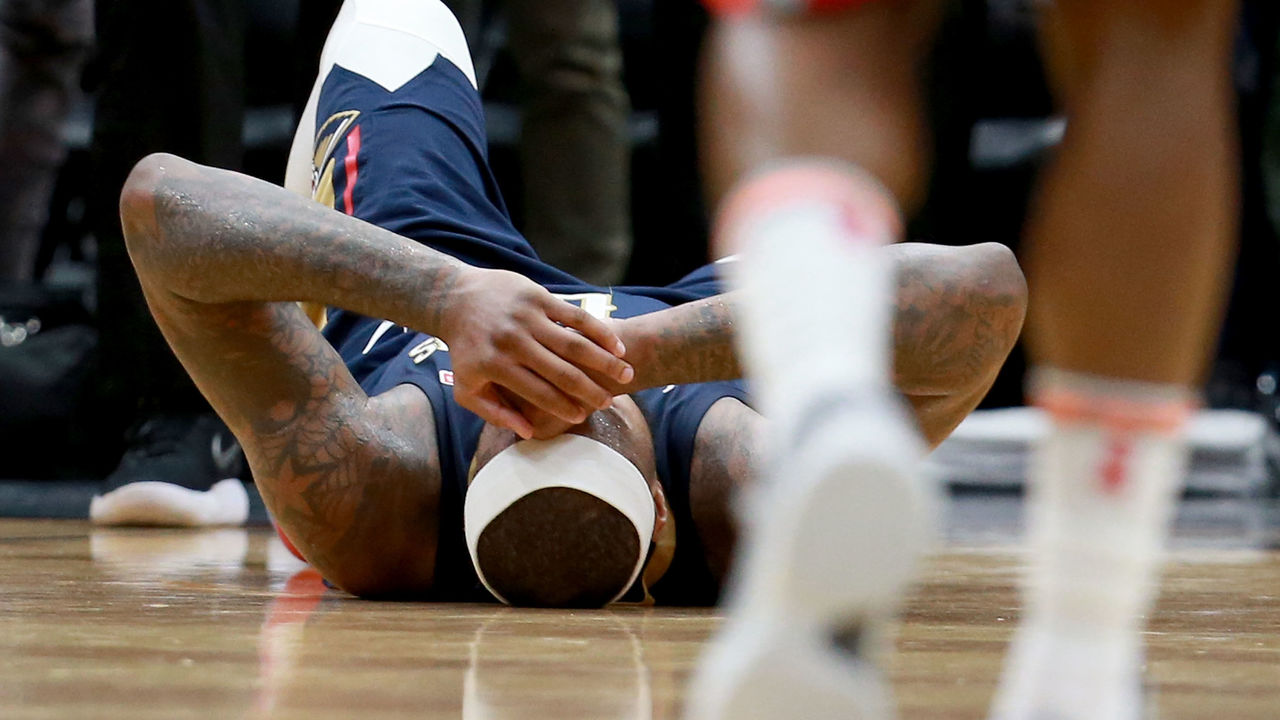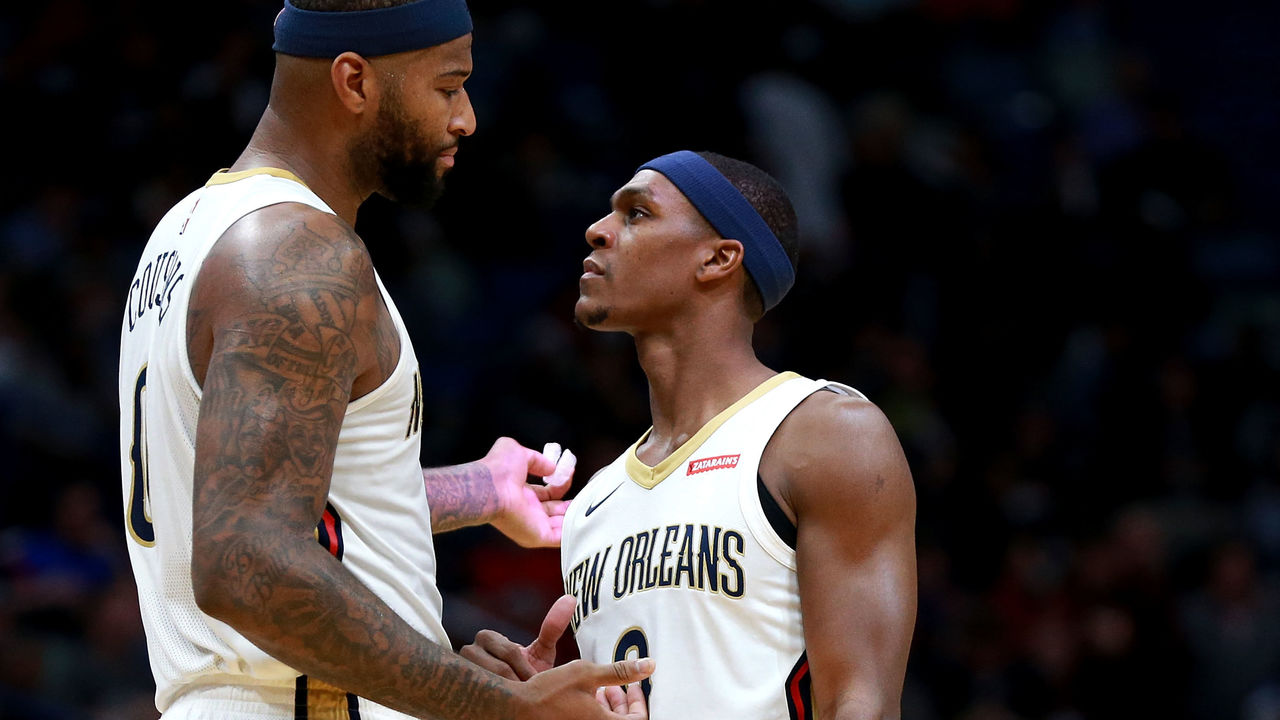Better Luck Next Year: New Orleans Pelicans edition
As NBA teams are officially eliminated from title contention, theScore NBA freelance writer Andrew Unterberger takes a look back at the highs and lows of their season, along with the biggest questions ahead of 2018-19. The 25th edition focuses on the New Orleans Pelicans.
The Good

Anthony Davis, world-swallower. 2017-18 was hardly a coming-out party for Anthony Davis, who was already a four-time All-Star and two-time All-NBA performer. But the question of whether the singular big man could scale another level of excellence was answered this season - particularly in the second half, when Davis put the injury-stricken Pelicans on his back and elbowed his way into the MVP conversation. He ultimately averaged about 28 points and 11 rebounds on 53 percent shooting while leading the league with nearly three blocks a game, and lifting the Pelicans to their best record since Chris Paul's New Orleans peak. Can he get to another level beyond this one? The rest of the West better hope not.
Jrue Holiday, finally healthy. Those who'd seen what Jrue Holiday could do over a full season had little doubt that he could be a true franchise co-anchor. However, that group of people wasn't very large, since he hadn't played over 70 games in a season since being traded to New Orleans on draft night in 2013. The Pelicans were practically forced to give Holiday a $125-million-plus, five-year contract over the summer to get him to stick around, but to the surprise of many, he finally earned that kind of investment with his All-NBA-caliber two-way play. He posted career highs in PPG (19.0) and field-goal percentage (49.4) and played lockdown perimeter defense all year - including on Damian Lillard, holding Portland's elite point guard to paltry numbers in the Pels' first-round victory over the Blazers - and he did it over 81 regular-season games and all nine of the team's postseason contests.
That 10-game win streak. Many counted the Pelicans out after they lost DeMarcus Cousins in late January, especially after the team followed that with five losses in their next six games. But then the Pels, led by Davis and Holiday, got it together just in time, ripping off a 10-game win streak - seven of those victories on the road. The streak ended with a sprained ankle for Davis and a double-digit loss to the Wizards, but the Pelicans had reasserted their Western Conference relevance, and saved the franchise from a host of tough end-of-season decisions.
Rejuvenated Rondo. The myth of Playoff Rondo might be a tad oversold, but he was solid pretty much all year for New Orleans, averaging about eight points and eight assists on his best field-goal percentage (46.8) in a half-decade while pushing New Orleans' attack to the league's fastest pace. He managed not to kill the Pelicans' offense with his poor shooting or submarine their defense with his gambling and poor effort - and indeed, he had several signature performances in the playoffs, including a 4-10-21 stat line in a Game 3 victory over the Warriors (New Orleans' sole second-round win). There may be a ceiling to how good a team can be with Rondo running the point, but he's at least re-established himself as a valuable contributor.
A series sweep. Not since the Pelicans ended the Avery Johnson era in Dallas a decade earlier had they won a playoff series - a streak few predicted would end this year, although just a game separated the sixth-seeded Pellies from the third-seeded Blazers in the standings. But not only did New Orleans take down a Portland squad with home-court advantage, they took 'em in straight sets, and only the first game came down to the wire. Davis and Holiday were particularly spectacular in Game 4; both scored over 40 points, led by AD with 47 points and 10 rebounds. "In a close-out game and then the magnitude of the situation, this is probably the best game he's played since I've been here," Pelicans coach Alvin Gentry said postgame. "He just was not going to let us lose."
The Bad

DeMarcus goes down. The only major damper on what was otherwise a dream season for the Pelicans was the injury to Cousins in that January win over the Rockets. New Orleans had just started to find a rhythm with DMC in the lineup, winning 6 of 7 and appearing to be en route to what would've been Cousins' first career postseason appearance. But then the big man, who was averaging about 25-13-5 on 58 percent true shooting, tore his Achilles, ending his season and putting his future effectiveness in question. He was a good teammate on the sidelines, and the Pelicans clearly thrived without him, but fans were left to wonder what a healthy Boogie could've added in the second round, as the team simply didn't have the weapons to compete with the Warriors.
Solomon Hill's lost season. Before Cousins' injury, the Pelicans' primary health concern was busted wing Solomon Hill. He'd been a decently useful sorta-3-and-D wing for New Orleans the previous season, but missed most of 2017-18 with a hamstring injury. He returned for the final few weeks of the campaign, but was badly compromised on offense, averaging just two points a game on horrid 27 percent shooting - numbers that improved only marginally in the playoffs. Hill has another two years and $25 million on his contract, so Gentry and Co. better hope a healthy offseason does wonders for his on-court production.
Frontcourt depth. After Cousins got hurt, Davis went from being the team's nominal power forward to more or less its full-time center (minus a run where the team dusted off Emeka Okafor to man the middle). An emergency trade-deadline deal for Nikola Mirotic helped, but by the playoffs, Davis was playing nearly 40 minutes a night, with no real bench option to spell him besides spot minutes for the undersized Cheick Diallo. Depending on the Pels' offseason strategy, that might not end up being a huge short-term problem for New Orleans, but it could be precarious in the long term, particularly for a player with Davis' injury history.
4-for-26 in Game 4. Bombing from distance wasn't as big a problem for the Pelicans as you might've expected, considering Hill's injury and their offseason acquisitions of famed non-shooters Rondo and Tony Allen. The Pelicans ended the year 13th in the league with a 36.2 percent mark from deep - not bad considering their offense was built around two bigs for most of the season - but in the playoffs, their shooting deserted them when they needed it most. In an ultimately series-swinging Game 4 against Golden State, New Orleans shot just 4 of 26 from distance. The Warriors, meanwhile, went 11 of 33 and won by a 26-point margin at the Smoothie King Center. "We missed a lot of easy shots, a couple game-plan discipline mistakes early on, and they came out on fire," Davis lamented after the game. "We just can't afford to shoot that poorly."
No 1st-round pick. When the Pelicans pulled off their quasi-panic-trade for Mirotic, they sacrificed a first-round pick - a hefty price for a player the Bulls practically had to get rid of. The deal was still a relative success for New Orleans: Mirotic fit well and produced decently, and the Pelicans' strong end to the season means Chicago's only getting a No. 22 pick. But it's still a loss for a cap-strapped team that's not particularly deep and could definitely use a young player on a rookie contract.
The Questions

What to do about DeMarcus? The Pelicans essentially have no way of adding another All-NBA-caliber player to go with Davis and Co. besides re-signing Cousins, an unrestricted free agent in the offseason. But after an Achilles injury that's hampered the careers of so many before him, is Cousins still that type of player? If he is, is another big man the best avenue to success for the Pelicans, who already have arguably the league's best big but precious little production on the wing? And can DeMarcus, who has yet to taste the postseason, elevate the now playoff-tested Pelicans to championship contenders? The Pels almost certainly have to choose from several less-than-ideal options this offseason - it may just be a question of which move does the least long-term damage.
Is Rondo a long-term piece? Though Rondo was obviously a feel-good story for the Pelicans, they still rated slightly better on both sides of the ball with him off the court. Already well into his 30s, he's a free agent this summer. New Orleans might decide to tempt fate by re-signing the mercurial point guard - but is he too integral to the Pelicans' new identity for them to cut bait? He's developed into a beloved teammate and something of a fan favorite, and the team can't spend much on a replacement, so saying goodbye might not be so easy.
Who starts on the wings next year? An underrated positive from the Pelicans' season was E'Twaun Moore, who averaged about 13 points a game on 59 percent true shooting while playing solid defense - exactly the kind of wing the Pels need around Holiday and Davis. But that's one season in a journeyman's career for Moore, and the rest of the team's wing rotation didn't add a ton: Hill was injured, Allen got traded to Chicago, Ian Clark was inconsistent, and Darius Miller was a good floor-spacer but a defensive minus. New Orleans is unlikely to add much via free agency, and needs to sort out a wing rotation from this mess somehow - which will become a particular challenge if the team lets Rondo walk, forcing Holiday back to the point.
Can a team built around Holiday and Davis - and possibly Cousins - stay healthy enough to compete? Another problem with re-signing post-injury Cousins as the final prong of the Pelicans' Big Three is that the other two are hardly sure things. Holiday and Davis missed a combined 186 games in their first four seasons as teammates before finally playing 154 of 162 this season. Building a team around this trio - particularly a team without a ton of depth around or behind them - would be something of a house of cards. Going an entire season without one of those cards getting pulled would be something of a miracle.
If those three are healthy, is that team good enough to contend? Holiday and Davis finished the season as top 20 players, and Cousins has been that caliber of player for most of his career, so a lineup built around them would seem to be something pretty special. But with the Warriors established as a superteam from now until essentially forever, and the Rockets now joining them in the Western Conference stratosphere, "pretty special" might not be enough to put a team into the championship picture. For New Orleans, a city without a ton of established NBA tradition, a half-decade of second-round exits might be good enough - but will Davis, who has a player option for 2020-21, want to stick around? The clock is always ticking for the Pelicans, and every decision between now and then is a potentially pivotal one.
(Photos courtesy: Getty Images)